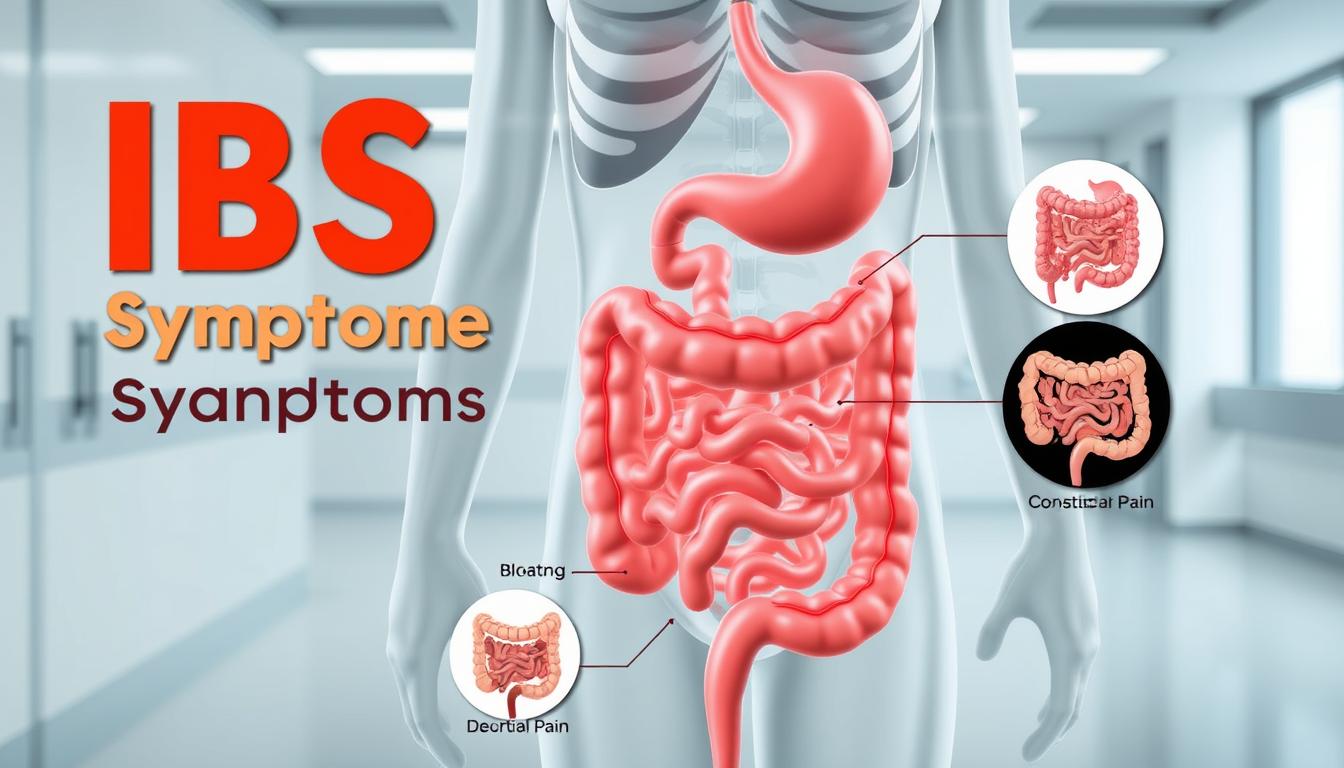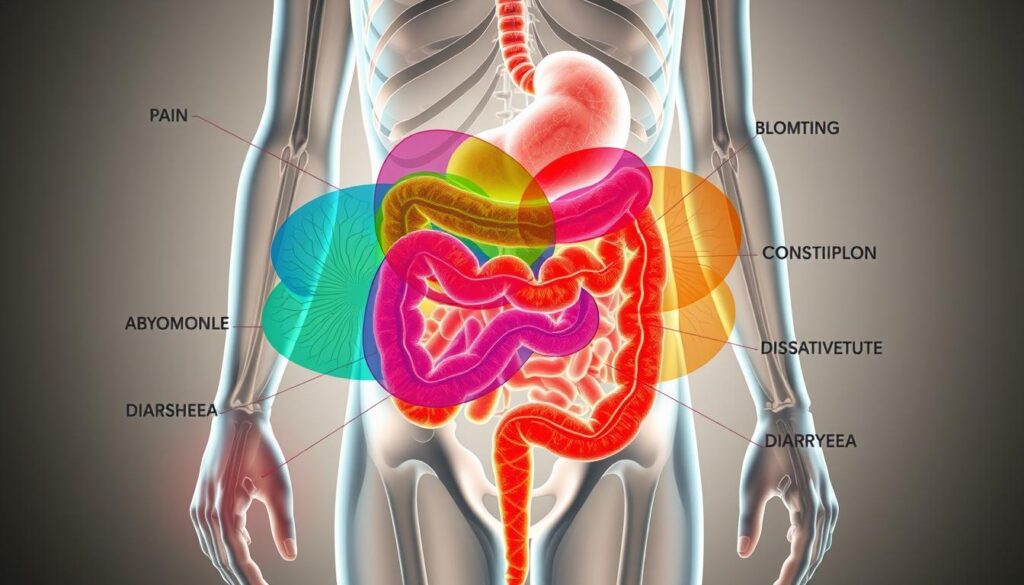IBS Symptoms: Complete Guide to Identifying Your Triggers

Are you tired of digestive issues that pop up without warning? You’re not alone. In the U.S., 10% to 20% of adults deal with Irritable Bowel Syndrome Symptoms. These can include stomach pain, bloating, diarrhea, and constipation.
Knowing what triggers your symptoms is crucial. This guide will help you understand IBS Symptoms. You’ll learn what causes your discomfort and how to manage it.
Key Takeaways
- Understand the common symptoms associated with Irritable Bowel Syndrome.
- Learn how to identify your personal triggers.
- Discover effective strategies for managing your digestive health.
- Explore the various factors that contribute to IBS Symptoms.
- Gain insights into creating a personalized plan for symptom management.
What Is IBS and Its Impact on Daily Life?
Living with Irritable Bowel Syndrome (IBS) is tough. It affects your digestive health and overall well-being. IBS is a condition of the gut. It causes abdominal pain, bloating, and changes in bowel movements.
Overview of Irritable Bowel Syndrome
IBS is a complex condition that affects the large intestine. It causes symptoms that can be mild or severe. It’s a chronic condition that needs long-term management.
The exact cause of IBS is unknown. But, changes in gut motility, hypersensitivity, stress, and certain foods can trigger symptoms.
Understanding IBS symptoms is key to managing it. Common symptoms include abdominal pain, cramping, bloating, gas, diarrhea, and constipation. The severity and frequency of these symptoms vary from person to person.
Common Myths About IBS
There are many myths about IBS. One myth is that it’s caused by a poor diet or lifestyle. While diet and lifestyle can trigger symptoms, IBS is a real medical condition that needs proper diagnosis and treatment.
Another myth is that IBS is just a fancy term for “nervous stomach.” In reality, IBS involves complex interactions between the gut, brain, and nervous system. It’s more than just a simple stomach issue. It also affects gut health and overall well-being.
How IBS Affects Mental Health
IBS can deeply affect mental health. It can lead to anxiety, depression, and stress. The chronic nature of IBS and its unpredictable symptoms can cause frustration, embarrassment, and isolation.
Managing IBS symptoms is crucial for both physical and mental health. It’s important to recognize the link between gut health and mental well-being. Research shows a strong connection between the gut and the brain, known as the gut-brain axis. This means that abdominal pain and other IBS symptoms can be closely tied to stress and emotional factors.
Key Symptoms of IBS
IBS symptoms can be tricky to understand. Knowing the common signs helps you deal with it better. Irritable Bowel Syndrome (IBS) messes with your large intestine, causing pain and disrupting your day.
Abdominal Pain and Discomfort
Abdominal pain is a big sign of IBS. This pain can be mild or very bad. It usually feels like cramping in the lower belly and gets better when you go to the bathroom.
Watching how your pain changes can help you find what makes it worse. This way, you can better manage your symptoms.
Bloating and Gas
Bloating and gas are big problems for IBS folks. Your belly might feel full or tight. Too much gas can make you feel uncomfortable and shy.
Changing what you eat can help with bloating. Stay away from foods that make gas.

Changes in Bowel Habits
IBS can mess with your bowel habits. You might have trouble going to the bathroom, or you might go too often. Tracking your bowel movements helps you see patterns. This lets you make smart choices about what you eat and how you live.
Mucus in Stool
Some people with IBS find mucus in their stool. It might sound scary, but it’s a known symptom. Mucus means your bowel might be inflamed.
If you see mucus or other weird stuff in your stool, talk to a doctor. They can help figure out what’s going on.
Knowing these symptoms helps you take charge of your IBS. By spotting the signs and making smart lifestyle changes, you can lessen IBS’s impact on your life.
Types of IBS: Which One Do You Have?
It’s important to know the different types of Irritable Bowel Syndrome (IBS). Each type is based on how often you go to the bathroom. This can change a lot from person to person.
Identifying your IBS type helps you find the right treatment. There are three main types: IBS-C, IBS-D, and IBS-M. Each has its own signs.
IBS-C (Constipation-Dominant)
If you always have trouble going to the bathroom, you might have IBS-C. This means your stools are hard or lumpy. You might also feel like you’re straining too much.
To manage IBS-C, you might need to change what you eat. You could also try fiber supplements or laxatives to help with bowel movements.
IBS-D (Diarrhea-Dominant)
If you have frequent diarrhea, you might have IBS-D. This type means you have loose or watery stools. You might feel like you need to go to the bathroom right away.
For IBS-D, your doctor might suggest medicines to slow down your bowel movements. You might also need to make some changes in your diet.
IBS-M (Mixed Type)
Some people have both constipation and diarrhea, known as IBS-M. This type can be hard to manage because your bowel habits can change a lot.
To deal with IBS-M, it helps to know what triggers your symptoms. Keeping a diary of your symptoms can also be very helpful.
No matter the type, managing IBS symptoms usually means making some changes. This includes what you eat, how you handle stress, and possibly taking medicine. By figuring out your specific type and working with a doctor, you can find a plan that works for you. This can help you feel better and live a better life.
Common Triggers for IBS Symptoms
If you have IBS, finding what triggers your symptoms can change everything. IBS symptoms can come from many things. Knowing what they are is crucial for managing your condition.
What triggers IBS can differ from person to person. But, there are some common ones. Let’s look at them closely.
Dietary Triggers
For many, diet is a big factor in IBS symptoms. Some foods can upset the gut and cause symptoms like bloating and pain. They can also change how often you go to the bathroom.
- High-FODMAP foods: Foods with Fermentable Oligo-, Di-, Mono-saccharides, and Polyols can be tough. Beans, cabbage, and some fruits are examples.
- Dairy products: Many with IBS are lactose intolerant. This makes dairy a possible trigger.
- Gluten: Some people with IBS may also react to gluten, even without celiac disease.
A gastroenterology expert says, “Changing your diet is often the first step in managing IBS symptoms.”
“The right diet can greatly reduce IBS symptoms, making life better.”
Stress and Emotional Factors
Stress is a known IBS trigger. The gut and brain are connected. Stress can affect how the gut moves and feels.
Techniques like meditation, yoga, and deep breathing can help with stress. They can lessen stress’s impact on IBS.
Medications and Supplements
Some medicines and supplements can make IBS symptoms worse. It’s important to talk about your meds with your doctor.
- Antibiotics: They can change gut bacteria, possibly triggering IBS symptoms.
- Non-steroidal anti-inflammatory drugs (NSAIDs): These can irritate the gut lining, making symptoms worse.
By knowing and managing these triggers, you can control your IBS symptoms. This can improve your gut health.
How to Recognize Your Triggers
To control your IBS, you must know what causes it. Finding your personal triggers is key to managing Irritable Bowel Syndrome Symptoms well.
Keeping a Symptom Diary
Keeping a symptom diary is a great way to find your IBS triggers. You record what you eat, how stressed you are, and any symptoms like Abdominal Pain or Bloating all day.
This helps you see patterns. You might notice that eating dairy makes you bloated or that stress worsens your pain.
Elimination Diets
Elimination diets are another way to find triggers. You remove common trigger foods for 2-3 weeks. Then, you add them back one at a time to see how you react.
Common foods to avoid include gluten, dairy, and high-FODMAP foods. By removing and adding these foods back, you can find out which ones upset your Irritable Bowel Syndrome Symptoms.
- Gluten
- Dairy products
- High-FODMAP foods
Seeking Professional Guidance
While a diary and elimination diets help, getting professional advice is also crucial. A healthcare expert can give you personalized advice and a plan just for you.
They can also check if other things might be causing your symptoms. This ensures you get the right treatment for your IBS Symptoms.
- Consult with a gastroenterologist
- Discuss your symptom diary with your healthcare provider
- Follow a personalized treatment plan
Lifestyle Changes to Manage IBS
Managing IBS symptoms well needs diet changes, stress control, and exercise. These lifestyle shifts can greatly help your digestive health. They also cut down on IBS symptoms.
Diet and Nutrition Adjustments
Choosing the right foods is key for IBS management. Increasing fiber intake helps with bowel movements and constipation. Eat more fruits, veggies, and whole grains. Also, stay hydrated by drinking lots of water.
Avoid foods that make symptoms worse. These include dairy, gluten, and high-FODMAP foods. A food diary can show you which foods are bad for you. This helps you make better diet choices.

Stress Management Techniques
Stress can make IBS symptoms worse. Using meditation, yoga, or deep breathing exercises can lower stress. Doing these regularly can improve your gut health and overall health.
Also, establishing a relaxing bedtime routine and sleeping well can help. It’s important to take care of yourself and find time for relaxing activities.
Regular Exercise
Regular physical activity can help digestion and reduce IBS symptoms. Aerobic exercises like walking, cycling, or swimming are good. They help move your bowels and improve gut health.
Try to do at least 30 minutes of moderate exercise daily. Find a fun physical activity to make it easier to keep up with. This helps manage IBS symptoms better.
Medical Treatments Available for IBS
You don’t have to let IBS control your life. There are many medical treatments to help you feel better. Finding what works for you might take trying a few options.
Over-the-Counter Medications
OTC medications can help with IBS symptoms. Laxatives are good for constipation. Anti-diarrheal medications help with diarrhea. Always follow the instructions and talk to your doctor if you’re unsure.
Simethicone or activated charcoal can help with bloating and gas. But, always check with your doctor to make sure they’re safe with your other medicines.
Prescription Options
If OTC meds don’t work, your doctor might prescribe stronger ones. For IBS-C, linaclotide or lubiprostone can help. For IBS-D, eluxadoline or rifaximin might be used to slow down bowel movements.
Some antidepressants, even in small doses, can help with IBS symptoms. This is true even if you don’t have depression.
Alternative Therapies
Some people find relief with alternative therapies. Gut-directed hypnotherapy can help some IBS patients. Acupuncture may also ease abdominal pain and other symptoms.
Probiotics, found in some foods or supplements, can help manage IBS. They promote a healthy gut microbiome.
- Talk to your healthcare provider about treatment options.
- Keep a symptom diary to track what works and what doesn’t.
- Be patient; finding the right treatment can take time.
By trying these medical treatments and working with your healthcare provider, you can manage your IBS symptoms effectively.
When to See a Doctor for IBS Symptoms
If you have IBS symptoms that don’t go away, you should see a doctor. It’s hard to handle digestive issues by yourself. But sometimes, you really need a professional’s help.

Signs You Should Seek Medical Advice
Go to the doctor if you see these signs:
- Persistent or severe abdominal pain
- Rectal bleeding or bloody stools
- Unexplained weight loss
- Vomiting or difficulty swallowing
- Symptoms that worsen over time
These could mean a serious problem. Not getting help might make things worse. So, take care of your gut health early.
Understanding Diagnostic Tests
At the doctor’s, they might do tests to check your GI symptoms. These tests help figure out what’s wrong and if it’s IBS.
Here are some tests you might get:
- Colonoscopy: Looks inside the colon for problems.
- Sigmoidoscopy: Checks the sigmoid colon like a colonoscopy.
- Blood Tests: Sees if you have infections or inflammation.
- Stool Tests: Finds blood, parasites, or bacteria in your stool.
- Imaging Tests: Uses X-rays, CT scans, or MRI to see your digestive tract.
Knowing about these tests can make your doctor’s visit easier. It helps you get the right care for your IBS symptoms.
Knowing when to go to the doctor and what tests you might have helps you manage your digestive health. This way, you can live a life free from IBS symptoms.
Support Groups and Resources for IBS Patients
Living with Irritable Bowel Syndrome (IBS) can be tough. Finding others who get it can really help. Support groups and resources offer emotional support, advice, and education on managing IBS symptoms.
Finding Community
Joining a support group, online or in-person, can make you feel less alone. You can share your story, learn from others, and find new ways to deal with IBS symptoms.
Online Resources and Educational Materials
There are many online resources for IBS, like health websites and apps. You can also find books that help you understand gut health and digestive issues better.
Using these resources can help you manage your IBS better. You’ll learn more about your symptoms and make better choices for your health.
